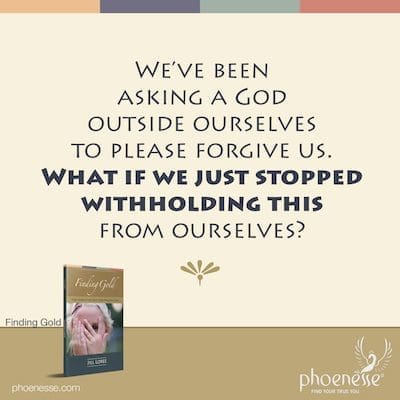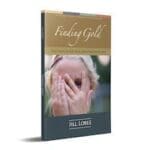Naturally, the nature of life is to be alive. Following so far? So then this must be true: life cannot be non-life. Keeping up? OK. So then what’s with our fear of death and the notion that life can suddenly become non-life. We unthinkingly take it for granted that the innate nature of life can suddenly turn into its opposite: non-life. But life can only be life. Hmmmm.

Everything created can only be what it is. It cannot be what it is not. Even though on the surface it may appear temporarily to be otherwise. It’s only in the dualistic state that prevails on planet Earth that we live with opposites inside of us. But this state is obviously quite limited compared to all of creation.
When we embark on a spiritual path, we discover that all opposites are illusion—they are facets of the same oneness. We learn that on the unitive plane, all contradictions can be reconciled. So if there is a oneness, it applies to everything. That means that all opposites can be reconciled, and that regarding life, there can only be life. So death then must be an illusion. Whew.
Here on this planet we call Earth, we are pretty much always focused on the stuff in front of our eyes. We don’t focus so much on the level of origin—the source of it all. The way life works, life radiates outward from the source. We can think of these streamings as energy currents or rays of life. But these rays are only outer messengers that serve to gradually bring life forth from its source.
In this way, life and divinity—which are one and the same—very gradually fill the void. The void is the universe, if you will, that has not yet been filled with God’s breath. As God takes further, deeper breaths, the unfilled void is being filled with divinity, with consciousness, with awareness, with light, with eternal life, with love and goodness. Once life has penetrated the void, it can never again be a void. It’s the void’s destiny to become filled with life.
It’s on the edge of where life and the void meet that energy congeals together with consciousness and this hardens into matter. Here we have manifestation. But it’s one step removed from life. It is enlivened by life. It is animated by life. But it exists on that outer border where life and nothingness meet. Consciousness cannot penetrate this void in full force, so a gradual process comes into play in which smaller fragments of consciousness reunite with their fuller essence as they are temporarily animated by the life spark. This happens over and over as the consciousness returns and returns, which is a process we call evolution. That’s the nature of the way life must go in the return to wholeness.
This is all well and good, but it’s awfully metaphysical and philosophical. If we can’t do something practical with this for our personal development, what good is it really. In fact, to use truths like this as mental constructions without any self-confrontation or link to our growth is to use spirituality as an escape from ourselves. And when we avoid personal self-development, we fail in fulfilling the task of our incarnation. So let’s get to work and do something with all of this.
In this sphere of existence, we confuse manifestation, which is animated by eternal life, with eternal life itself. Note, this will switch over time as a byproduct of doing purification work. We will come to realize that life can temporarily withdraw itself from the matter it created. The matter then dissolves back into its original substance. Life will then animate a new form. In this way, evolution rolls forward as an ever-changing process.
Our fear of death arises from being identified with the wrong thing. We think we are the manifestation that is animated by the source. We are actually the source. Our personality, our thinking and feeling, our being and experiencing, our willing and deciding—all that is source. Non-life can’t do these things. In our confusion, we have a fear of not being.
Everything we are right now, even in our crazy mixed-up ways, can never not be. In our being, we can mold the world we manifest. We can expand our consciousness, our creative ability and our sense of who we really are. And yet somewhere, somehow, in some part of ourselves, we believe that when we withdraw our life from the matter we created, we will cease to be.
Not so, folks. Not only will our limited personality continue, so will our potentialities, which keep increasing in self-awareness. Eventually, we’ll figure it out about our unlimited continuity. Then matter and source will merge.
Our work is to overcome whatever obstructs this from happening. Fear of death is one of those obstructions. Another is our approach to self as we go along our path of purification. Here, the issue is related to our confusion about accepting the self with all its Lower Self ways, none of which are pretty to look at, and yet seeing its damaging effects for what they are.
We confuse self-acceptance and self-forgiveness with whitewashing the Lower Self, condoning its negative ways. Let’s go one more. We also confuse self-devastating guilt and self-hate with honestly admitting what’s wrong with us and needs to be changed. The confusion in this duality really kicks our tails.
Either approach is a real buzz-kill for doing the hard work of growing, expanding and becoming one with God. Thing is, we do have to accept and forgive our negative aspects, seeing them in context with the rest of ourselves. But that doesn’t mean we condone them. If, by now, this seems like a common theme in these teachings, it is because it bears repeating. Because we tend to stumble on this part again and again.

Accepting and forgiving ourselves without condoning our negative aspects gets tangled up in our fear of death—or fear of non-life—in two apparently opposite ways. First, we tend to believe, either consciously or unconsciously, that one of the worst punishments is threat of extinction. We don’t want to be snuffed out. When we don’t forgive ourselves, it triggers this fear, bringing this threat—and our fear of death—front and center.
Second, our fear of death creates a fear of movement, which is so contrary to being in reality. Because life is always on the move. When the music stops, movement stops. But it seems to us that time is forever marching on, and so life appears to be a constant movement in the direction of dying. Change, then, seems to be the thing that accelerates the process of dying. If that’s the case, then being immobile should stop time. Right?
Herein lies a major explanation for why we resist and distrust change, and therefore growth. This illusion that we can stop time by stopping movement is so primitive it borders on superstitious. Yet we each hold onto rather absurd misconceptions such as this in deeply buried levels of immature reasoning. We’re almost ferocious in the way we hold onto them, letting them govern our lives.
When our mature mind becomes aware of this, we are at first unable to even comprehend that thoughts like this are rolling around inside us—and running the show. The final gotcha here is that remaining stagnant is the thing that courts the death of Earth things. It encourages the will of the life force—that animating consciousness—to withdraw and start over.
It is our commitment to changing and bringing forward our divine potential that leads us out of duality. When two opposites fuse into a unity, then we can become charitable with ourselves, facing our Lower Selves with mercy, love and self-forgiveness. We can do so openly—without whitewashing or explaining away our still-dirty spots. We won’t need to shift blame onto others. And yet we won’t bury ourselves in self-hate.
We will come to see, not that this is a possibility, but that it is a necessity. On the unitive plane, opposites don’t just put up with each other—they need each other. One side is unthinkable without the other. So we will aspire to bringing out both sides to be able to live in balance.
It is by embracing an utter commitment to moving and changing that we experience ourselves as beings who must continue to be. No matter how much we change and grow, we ultimately remain who we are. And bottom line, we are God. And we become more of this as we bring out our potential.
This isn’t blasphemy. Everything that exists, that lives and breathes, is a manifestation of God, of life. Because God is life and life force. God is that which enlivens us, which makes us eternal beings. Our stumbling once again upon self-hate in ourselves is a sign that we don’t yet fully realize this.
Or we might stumble over our defenses that we use to keep us from feeling the pain of our self-hate. This happens because we secretly believe the self-hate is justified, and that makes this pain even more unbearable.
We fear the way we are so unforgiving towards ourselves, and try to counter this with self-coddling and self-indulgence. In this way, we deny our Lower Self even exists. All this is a distortion of the unitive qualities of self-respect and self-honesty.
What’s the way out of this maze? We need to make some space for our own divinity. We need to realize that our Lower Self is nothing but a creation that has come about by the encounter of life with non-life. When that life stream met nothingness at the edge of the void, energy turned into matter. And then consciousness split off into a whole bunch of fragments. Truth and reality just got confused because of the limited perspective of those fragments.
It’s like taking truth and busting it up into pieces. That’s what all duality is: limited aspects that have lost track of their relationship to each other. So when our mind looks at two things and sees them as opposites, it gets confused. The way we perceive life as being split creates suffering. But the mind can become aware of all this. It can grope with split concepts until it sees how they can be unified.
Doing this takes some courage and a commitment to knowing divine truth. Then we can experience that great unitive reality: truth is love and love is truth. If we’re not feeling the love, we’re not yet in truth.

If we commit ourselves to knowing divine truth, we will increasingly experience life as being the be-all-and-end-all that it is. And we won’t keep confusing this with the body—the manifestation—that houses the spark. Our consciousness, which is all we know ourselves to be, is not bound to our body. And yet, particles of our consciousness will remain in every cell, in every molecule, in every atom of the matter that our consciousness created.
So our bodies, then, are reflections and expressions of our consciousness. But when our consciousness withdraws from this body, it will continue unaffected and unchanged from the way we know it now. The body will seem to then disintegrate. But it too goes through an immense process in which every cell goes on to find new cells and create new forms, making room for new vehicles.
So every cell that is left behind harbors within it a spark—a tiny spark—of that life. Those tiny sparks travel through channels that follow laws of attraction and repulsion. These laws are impossible for human consciousness to understand.
And since every particle of matter contains inherent aspects of consciousness, there can be no cells in a dead body that aren’t expressions of the total personality that enlivened and animated it. This is what determines the future journey of these cells as they disintegrate and reintegrate.
When cells reunite and form new combinations, they create genes. These genes within the human structure change as consciousness changes. They aren’t the same today as they will be tomorrow and a few years from now, provided the person is growing and moving.
So you may be wondering: what on earth does any of this have to do with learning self-forgiveness on the one hand and self-confrontation on the other? Great question. There is a deep but extremely relevant connection between self-hate, fear of punishment, fear of death and the disintegration of the cell structure that falls into a channel and then is attracted into a new form.
It’s like this. Our thoughts are creations that have their own cell structure and their own matter, but it is of a density that is invisible to us. If we are living in a split-off reality, we are going to need to hate ourselves if we want to face the truth about our Lower Selves. Either that, or we are going to have to deny the truth about our Lower Selves in order to not hate ourselves and fear our dying—not existing. This drops us into a channel that keeps chunking out these invisible thought forms in an ever-repeating pattern of confusion-and-suffering, confusion-and-suffering.
But how about we take an entirely new approach to ourselves. (Well, entirely new and yet not-so-new.) What if we allowed the God that is in us—and which we can be the moment we decide we want to be—to be in the state of self-love and self-forgiveness in the most divine and healthy way. No trace of self-indulgence or denial of what is true in our Lower Self. Just love and compassion for our wonderful struggle. Just respect for our wonderful honesty, even if what we’re looking at is our dishonesty.
What if we choose other thoughts than the current patterns we take for granted. Our habitual peace-nabbing thoughts are our worst enemy, yet we let them stay. What if we got a little distance from them and stopped animating them with self-hate, distrust and hopelessness.
Facing our Lower Self means we deserve some mercy here—some self-forgiveness. And how about some of that love we have been praying for, for millennia. We’ve been asking a God who lives outside ourselves to give us this: please be kind and merciful and loving to us. What if we just stopped withholding this from ourselves?
Return to Finding Gold Contents


